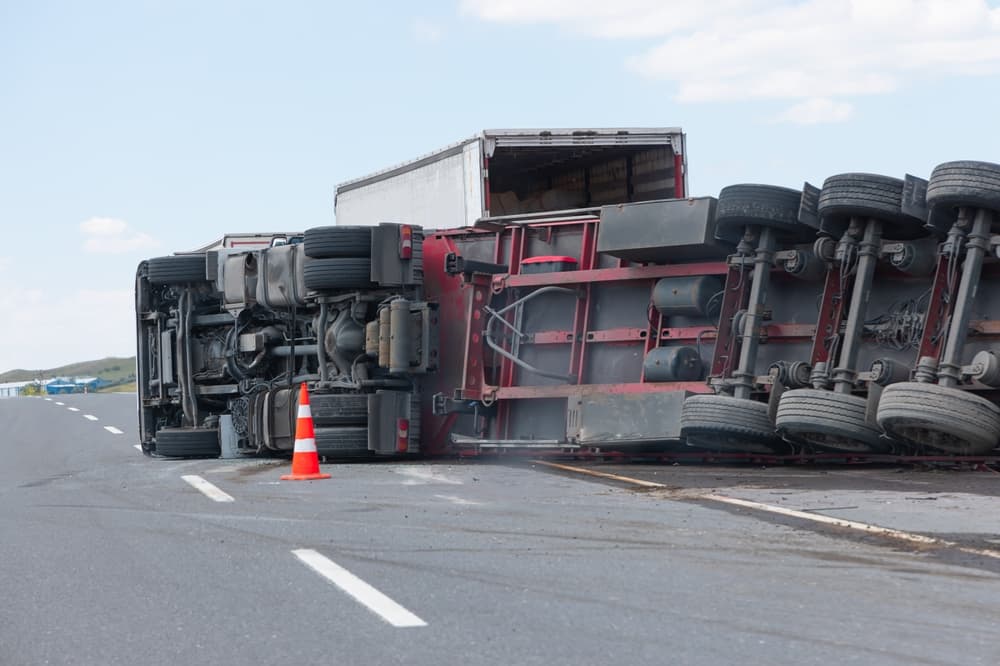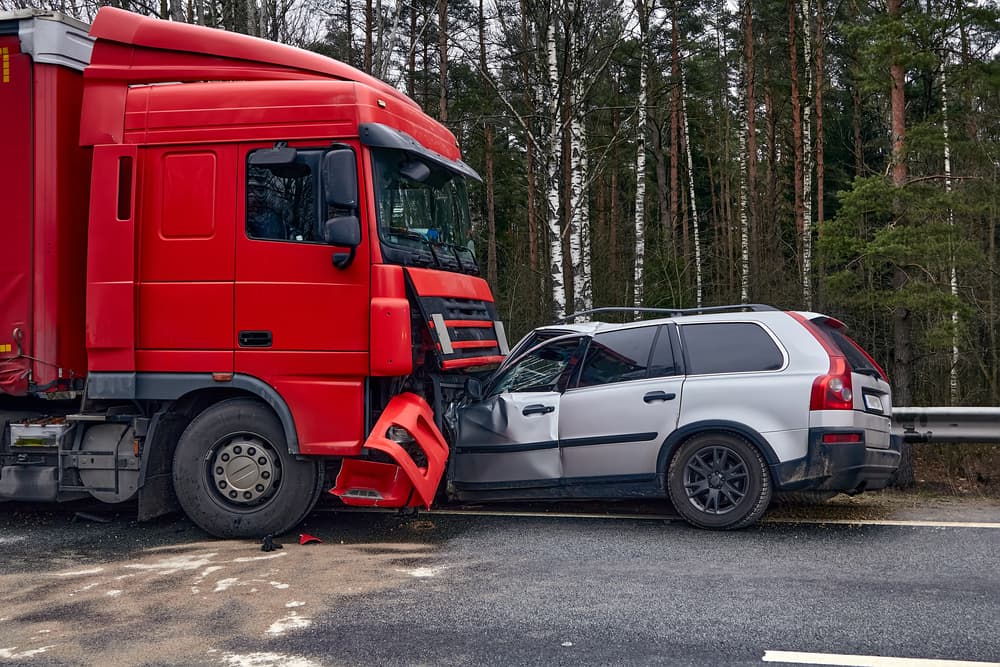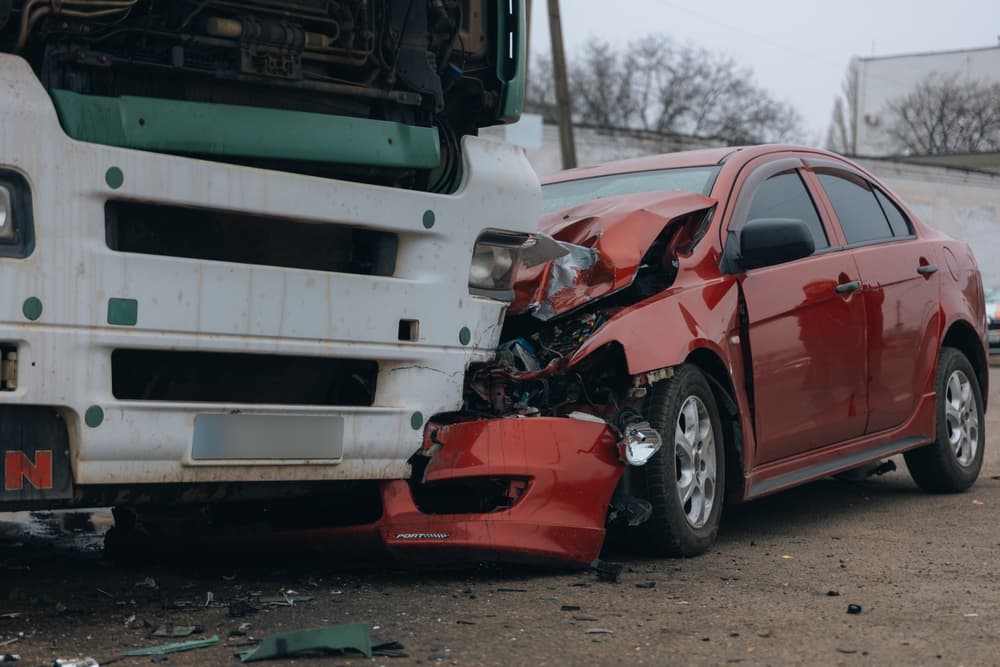
Top 5 Causes of Truck Accidents in New York
The scene is a familiar one on New York’s sprawling network of highways. From the Cross Bronx Expressway to the I-87, a momentary lapse—a swerve, a missed signal, a delayed stop—involving a commercial truck can instantly erupt into a catastrophic event.
While official reports may label these events as “accidents,” a closer examination frequently uncovers a story not of random misfortune but of systemic issues and preventable failures. Understanding these root causes is crucial, as they reveal the stark reality that most truck crashes are not accidental at all.
Most Common Causes of Truck Accidents in New York
Large commercial trucks, or tractor-trailers, are a constant presence on our shared roads. They are the lifeblood of commerce, but they also pose an immense risk when not operated with the highest degree of care. When that care is absent, the consequences are devastating.
Let’s explore the top five reasons these catastrophic collisions occur, not as a technical exercise, but as a way to shed light on what may have happened to you.
1. Driver Fatigue: The Silent Threat on Our Highways
We’ve all felt tired behind the wheel, but the fatigue experienced by many commercial truck drivers is on an entirely different level. It’s a bone-deep exhaustion that dulls the senses, slows reaction times, and severely impairs judgment. A drowsy driver is, in many ways, as dangerous as a drunk driver. Their ability to perceive hazards, make split-second decisions, and control an 80,000-pound vehicle is tragically compromised.
Why is this so common? The pressure on truck drivers is immense. They face demanding schedules, tight delivery deadlines, and financial incentives to keep their wheels turning for as long as possible. To combat this known danger, the Federal Motor Carrier Safety Administration (FMCSA) has established strict Hours-of-Service (HOS) regulations. These rules dictate:
- How many hours a driver can be on the road in a single day (11 hours).
- How many hours they can work in total before taking a mandatory break (14 hours).
- The required length of their rest periods.
Unfortunately, these rules are often bent or broken. A driver, pressured by their dispatcher, might push on for an extra hour or two to make a delivery on time. A trucking company might foster a culture that encourages drivers to falsify their electronic logging devices (ELDs) or paper logbooks to hide HOS violations.
When a crash is caused by fatigue, it isn’t just about a sleepy driver. It can be a chain of negligence that leads back to the trucking company itself—a company that prioritized profits over the safety of everyone else on the road, including you. The driver who fell asleep at the wheel on I-95 wasn’t just having a bad day; they were likely the final, tragic link in a chain of irresponsible decisions made in a corporate office.
2. Distracted Driving: A Moment’s Glance, a Lifetime of Pain

In today’s connected world, the temptation of distraction is everywhere, and commercial truck drivers are not immune. However, the consequences of their distractions are magnified exponentially by the size and weight of their vehicles. A passenger car drifting out of its lane is dangerous; a tractor-trailer doing the same is catastrophic. It takes the length of a football field for a fully loaded truck traveling at highway speeds to come to a complete stop. A few seconds of inattention is all it takes to erase that critical stopping distance.
Distracted driving for a trucker goes beyond just texting or talking on a personal cell phone. Their cabs are complex cockpits filled with potential diversions:
- Dispatch Radios and Onboard Computers: Constantly receiving updates, new instructions, or messages from their company.
- GPS and Navigation Systems: Programming a new route or checking a map while the vehicle is in motion.
- Eating, Drinking, or Adjusting Controls: Simple acts that take their hands off the wheel and their eyes off the road.
- Paperwork: Reviewing bills of lading or trip logs while driving.
When an accident happens because a driver was looking at their phone instead of the road ahead, the blame is clear. But the investigation shouldn’t stop there. Does the trucking company have a clear, strictly enforced policy against distracted driving? Do their communication protocols require drivers to pull over to read and respond to non-urgent messages? Or do they create an environment where drivers feel they must multitask just to keep up?
A moment’s distraction can shatter a life, and the responsibility often extends beyond the driver’s seat.
3. Improper Maintenance and Equipment Failure: A Disaster Waiting to Happen
You trust that the vehicles you share the road with are in safe, working order. For commercial trucks, this isn’t just a hope; it’s a legal requirement. Trucking companies have a duty to ensure their entire fleet is meticulously inspected, maintained, and repaired. When they cut corners on maintenance to save money, they are knowingly putting ticking time bombs on our highways.
Some of the most common and devastating equipment failures include:
- Brake Failure: A truck’s air brake system is complex. If it’s not properly maintained—if brake pads are worn, fluid levels are low, or adjustments are ignored—the truck can lose its most critical safety feature. You may have been in a situation where you saw a truck coming, but it just didn’t stop. This is often the terrifying result of brake failure.
- Tire Blowouts: Commercial truck tires are under extreme pressure and stress. Worn-out treads, improper inflation, or defects can lead to a sudden, violent blowout. This can cause the driver to lose control, sending the truck veering across multiple lanes of traffic or causing shredded debris to fly into the path of other cars.
- Steering and Suspension Failure: Worn-out components in the steering or suspension can make the truck impossible to control, especially during an emergency maneuver or on uneven pavement.
- Defective Lights or Signals: Malfunctioning brake lights, turn signals, or headlights make the truck’s intentions invisible to other drivers, particularly at night or in bad weather, leading to horrific rear-end or side-impact collisions.
When a crash is caused by a mechanical failure, the investigation must focus on the truck’s maintenance records. Were regular inspections performed and documented? Were known issues ignored? Were cheaper, substandard parts used?
The negligence in these cases often lies with the trucking company or the third-party maintenance shop that failed in its duty to keep the vehicle safe.
4. Speeding and Aggressive Driving: A Reckless Disregard for Human Life
The sheer size of a large truck can be intimidating. When that size is combined with excessive speed and aggressive behavior, it becomes a weapon. Drivers who speed, tailgate, make improper lane changes, or weave through traffic are not just being impatient; they are demonstrating a reckless disregard for the lives of everyone around them.
As with fatigue, this behavior is often driven by pressure. A driver running behind schedule may speed to avoid financial penalties or reprimands from their employer. They might tailgate the car in front of them to bully them into moving over, or make a sudden lane change without enough space, forcing other drivers to slam on their brakes or swerve out of the way.
On the congested highways of New York and New Jersey, like the Major Deegan Expressway or the New Jersey Turnpike, there is simply no margin for this kind of error. A truck traveling just 10 mph over the speed limit needs a significantly longer distance to stop and is far more likely to roll over in a turn. When they collide with a smaller passenger vehicle, the laws of physics are cruel and unforgiving. The force of the impact is often unsurvivable.
Proving this cause can involve analyzing the truck’s “black box” data recorder, which tracks speed and braking, as well as securing eyewitness testimony. It’s about showing that the driver wasn’t just making a simple mistake; they were making a conscious choice to operate their vehicle in a dangerous and illegal manner.
5. Improper Cargo Loading: The Unseen Danger

A truck’s danger isn’t just in its engine or its driver; it’s also in the trailer it’s pulling. The cargo inside must be loaded, balanced, and secured with scientific precision. An improperly loaded trailer can transform a stable vehicle into an uncontrollable force.
This critical task is often handled not by the driver, but by the shipping company or a third-party warehouse crew. Their failures can lead directly to a crash in several ways:
- Overloaded Truck: Every truck has a maximum legal weight limit. Exceeding this limit puts immense strain on the brakes, tires, and engine, making the truck harder to stop and more prone to equipment failure.
- Unbalanced Load: If the weight is not distributed evenly across the axles, the truck can become top-heavy and dangerously unstable. This makes it highly susceptible to rolling over, especially on curves, exit ramps, or in high winds.
- Improperly Secured Cargo: Cargo that is not tied down correctly can shift dramatically during transit. A sudden shift in weight can throw the entire rig off balance, causing the driver to lose control. In some cases, unsecured cargo can even break through the trailer walls and spill onto the highway, creating a deadly obstacle course for other vehicles.
If you were the victim of a rollover accident or were struck by falling debris, it is highly likely that improper cargo loading was a contributing factor. Determining fault requires a complex investigation into who loaded the cargo, what their procedures were, and whether they violated federal regulations. The driver, the trucking company, and the shipping company could all share in the responsibility for the harm that was done to you.
Trusted New York Truck Accident Lawyers Ready to Assist You
Reading about these causes may be difficult. It may bring back the trauma of your accident and fill you with anger and sadness. But there is power in this knowledge. What happened to you was not a random act of fate. It was the predictable outcome of negligence. A choice was made—to drive tired, to look at a phone, to skip a repair, to speed, or to improperly load cargo—and that choice shattered your world.
You have been through enough. The physical pain, the emotional trauma, and the financial anxiety are burdens no one should have to carry alone. In the face of powerful trucking and insurance companies who will try to minimize your suffering and deny their responsibility, you need a voice. You need a team that will stand in your shoes, learn your story, and fight to make sure you are heard.

At Maggiano, DiGirolamo & Lizzi, P.C., we represent the person next door. We understand that your case isn’t just a file number; it’s about your life, your family, and your future. For over 40 years, our team of dedicated personal injury attorneys has been fighting for people just like you.
Our primary focus is on complex trucking accident cases. We know the laws, we understand the technology, and we have the resources to take on the largest corporations. We are a rare firm that also handles workers’ compensation, meaning we can explore every possible avenue to maximize your recovery. You don’t just get one lawyer; you get a team of 30 people dedicated to your case.
Courage defines us. Justice drives us. Our clients inspire us. Let us be your courage. Contact us today today at (201) 585-9111 or through our online form for a free, confidential consultation to learn how we can help.



















